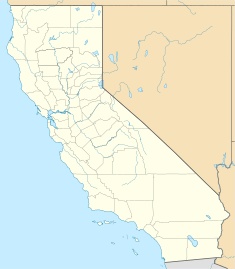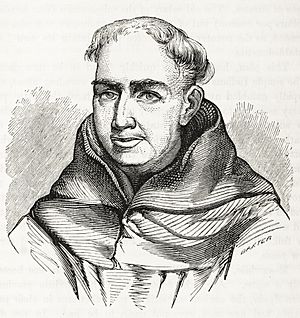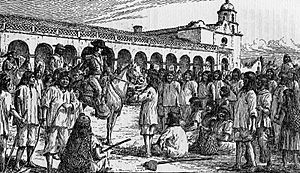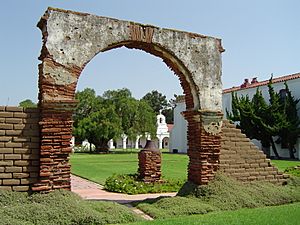Mission San Luis Rey de Francia facts for kids
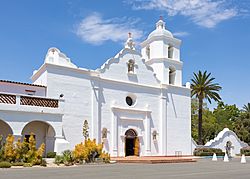
Mission San Luis Rey de Francia in July 2022
|
|
| Location | 4050 Mission Ave. Oceanside, California 92057 USA |
|---|---|
| Coordinates | 33°13′57″N 117°19′13″W / 33.23250°N 117.32028°W |
| Name as founded | La Misión de San Luis, Rey de Francia |
| English translation | The Mission of Saint Louis, King of France |
| Patron | Louis IX of France |
| Nickname(s) | "King of the Missions" |
| Founding date | June 13, 1798 |
| Founding priest(s) | Father Fermín de Lasuén |
| Area | 35 acres (14 ha) |
| Built | 1815 |
| Architectural style(s) | Spanish Colonial |
| Founding Order | Eighteenth |
| Military district | First (El Presidio Reál de San Diego) |
| Native tribe(s) Spanish name(s) |
Kumeyaay, Quechnajuichom Luiseño & Diegueño 'Mission Indians' |
| Native place name(s) | Quencha—Quechla |
| Baptisms | 5,399 |
| Marriages | 1,335 |
| Burials | 2,718 |
| Neophyte population | 2,788 |
| Secularized | 1834 |
| Returned to the Church | 1865 |
| Governing body | Roman Catholic Diocese of San Diego |
| Current use | Parish/Museum/Cemetery/Retreat House |
| Official name: San Luis Rey Mission Church | |
| Designated | April 15, 1970 |
| Reference no. | 70000142 |
| Designated | April 15, 1970 |
| Reference no. | #239 |
| Website | |
| http://www.sanluisrey.org/ | |
Mission San Luis Rey de Francia is an old Spanish mission located in Oceanside, California. It's in a neighborhood called San Luis Rey. The mission gave its name to the Luiseño tribe, who were also known as 'Mission Indians'.
It was once the largest of all the California missions. It covered a huge area, almost 950,400 acres, including its buildings and farms. Other smaller stations, like San Antonio de Pala Asistencia (built in 1816) and Las Flores Estancia (built in 1823), were also part of Mission San Luis Rey.
Contents
Exploring Mission San Luis Rey's Beginnings
The full name of the mission is La Misión de San Luis, Rey de Francia. This means "The Mission of Saint Louis, King of France." It was named after Louis IX of France, a French king. People often call it the "King of the Missions."
Father Fermín Lasuén founded the mission on June 12, 1798. It was the eighteenth of twenty-one Spanish missions built in Alta California. In 1800, the first Mission olive trees were planted here.
The Mission Church and Its Purpose
The main church you see today was built in 1815. It was the third church constructed at this spot. It is now a National Historic Landmark because it's a great example of a Spanish mission church.
Today, the mission is still a working parish church for the Roman Catholic Diocese of San Diego. It also has a museum and a retreat center. Mission San Luis Rey de Francia once raised many animals, including about 26,000 cattle, goats, geese, and pigs.
Life at the Mission: A Native American View
Pablo Tac, a Native American who grew up at the mission, wrote about his life there. His book, Indian Life and Customs at Mission San Luis Rey, was written around 1835. In it, Tac shared how many Luiseño people died after the mission was founded. He wrote that a sickness caused 2,000 deaths, leaving 3,000 people.
Tac also described how the Spanish priests, called padres, lived very well. He said the "Fernandino father is like a king." He had servants, leaders, musicians, and soldiers.
Changes During the Mexican Era
In 1830, the first Peruvian Pepper Tree was planted here. This tree is now very common in California and is called the "California Pepper tree."
After 1833, Mexico took control of California. The Mexican secularization act of 1833 meant that much of the mission's land was sold. Native American people, who had been forced to work at the missions, were now free. When the Luiseño people at San Luis Rey heard they were free, they left the mission. Thousands returned to their old communities.
The Mission During the Mexican-American War
During the Mexican–American War (1846–1847), the United States Army used the mission as a military base. In 1847, the U.S. military governor, Richard Barnes Mason, put an Indian agent in charge of the mission.
Jean Baptiste Charbonneau, a Native American who had traveled with the famous Lewis and Clark Expedition, was appointed as a local leader. He worked in the San Luis Rey area. Charbonneau later resigned, feeling that his Native American background made people think he was unfair.
Mission San Luis Rey in Modern Times
After the mission was closed in 1834, no religious services were held for many years. The Luiseño were left behind when the priests left.
In 1893, two Mexican priests were allowed to restore the mission. Father Joseph O'Keefe began restoring the old mission in 1895. The main courtyard and church were finished in 1905. A college for priests, San Luis Rey College, opened in 1950 but closed in 1969.
Mission San Luis Rey in Pop Culture
The mission has even been featured on TV! Some episodes of the Disney TV series Zorro were filmed here in 1957. The mission pretended to be the Mission of San Gabriel in the show.
In 1998, a special concert was held at the mission. It celebrated the mission's 200th anniversary. Famous musicians and a choir from St. Peter's Basilica in Rome performed. In 2013, the mission buildings were made stronger to protect them from earthquakes.
Today, Mission San Luis Rey de Francia is still an active place. It has a museum, a visitors' center, and beautiful gardens with the historic Pepper Tree. It also has its original small cemetery.
Images for kids
See also
 In Spanish: Misión San Luis Rey de Francia para niños
In Spanish: Misión San Luis Rey de Francia para niños
- Spanish missions in California
- List of Spanish missions in California
- Las Flores Asistencia
- Mission San Antonio de Pala
- Luiseño – Mission Indians
- Population of Native California
- California mission clash of cultures
- USNS Mission San Luis Rey (AO-128) – a ship named after the mission.
 | Emma Amos |
 | Edward Mitchell Bannister |
 | Larry D. Alexander |
 | Ernie Barnes |


